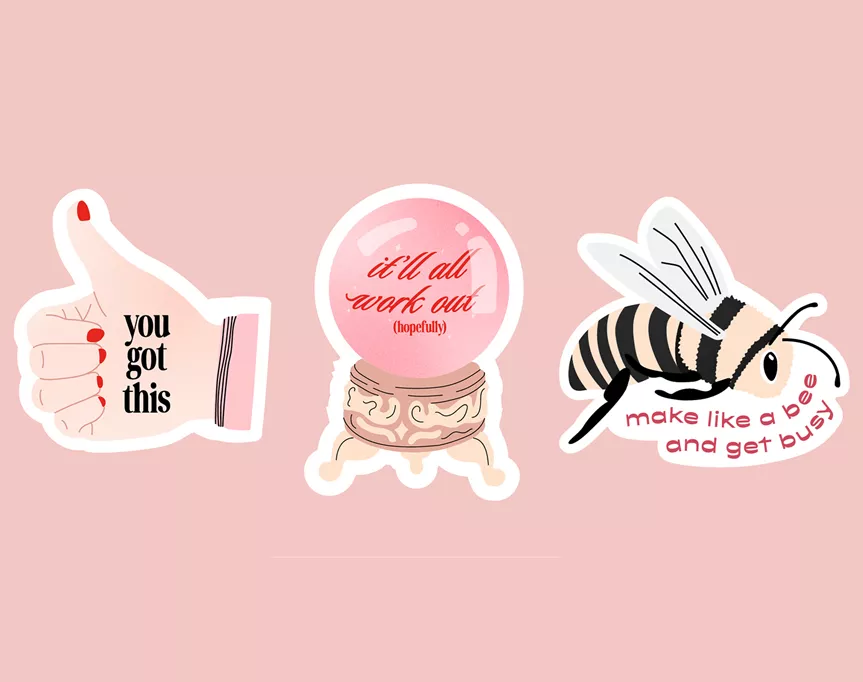how to nail that work-life balance while chasing your goals
Trying to maintain a work-life balance is hard, especially with the hustle and bustle of everyday life, but Kate Stanton is here to provide some needed tips and tricks for making the most out of both.
So, you’ve finally figured out your life goals (yay!), and you’ve decided to develop skills you need to pursue those goals, either by volunteering, working a side hustle or studying (also yay!). But — cue dramatic thunder claps — reality hits: you actually have to carve out time for all that goal-smashing, while also sleeping, eating, working your day job, going to therapy, hanging with mates, moisturising, and watching your favourite TV shows. No one wants to hustle for 24 hours a day — or you’ll wind up with a nasty case of burnout — so here’s a few tips for maintaining a reasonable work-life balance while chasing your dreams.
SET CLEAR BOUNDARIES The tricky thing about pursuing goals, especially ones we’re passionate about, is that we can use our dreams as an excuse to work all the time. But all that hard work will catch up with you if you don’t set clear boundaries between work, study and regular life. (Don’t be that friend writing uni essays in your Notes app when you’re at movie night). Here’s a few easy ways to keep those boundaries in check: treat studying or upskilling like a job with very specific hours. Clock in and clock out, like you would at an hourly job (one where the hardarse-but-nurturing boss is you). Create a cosy work space free of distractions — except the occasional, mood-boosting cup of tea. And tell your friends and family about your boundaries, so they know when to leave you alone to study, and when to drag away from the books for a cheeky pub sesh.
MAKE YOUR DIARY YOUR NEW BFF Diaries are super-important for folks with busy schedules. They’ll help you stay on top of assignments, keep track of deadlines, remember your mum’s birthday and any other important stuff you need to get out of your chaotic, crowded brain and in writing. Start by creating a time-management system that works for you, whether it’s a physical diary, a digital calendar or even a whiteboard with an almost unreadable mishmash of sticky notes and scribbles (as long as you know what it all means). If you need, don’t forget to leave enough time in your schedule for fun and relaxation.
STUDY ONLINE FOR FLEXIBILITY The internet is annoying for many reasons (why did I just watch an hour of TikTok videos when I’m supposed to be writing this article?), but it does mean that you can learn at a pace and schedule that suits your lifestyle and abilities. Need more time to absorb the material? You can often take classes at a slower pace. Can you only make Tuesdays work? Only study on Tuesdays! Plus, finding an online course to help you upskill means you can study from anywhere with an internet connection, whether it’s your favourite cafe or mum and dad’s couch (bonus: you get to eat the free snacks).
KEEP AN EYE OUT FOR BURNOUT Burnout can creep up slowly. You may think you’re thriving — smashing work, seeing friends, doing all your personal admin — until one day, the wrong coffee order makes you burst into tears. Typically, we don’t realise we need to slow down until we’re completely exhausted. But keep an eye out for symptoms, like irritability, negative attitudes, regular self-criticism, headaches and insomnia. There are plenty of ways to avoid getting burnt out in the first place, but you can start by taking regular breaks and indulging in seemingly unproductive stuff you love, like a walk to buy chocolate or a dumb movie or a 38-step skincare routine (only if you find that type of thing relaxing). Always check in with yourself and get professional help when you need it.
DON'T FORCE IT Set realistic goals for yourself, and don’t beat yourself up if they don’t work out the way you planned. The joy of retraining or upskilling is that you have a new opportunity to design a life that works even better than the one you have. When one approach isn’t working for you, sometimes the best thing you can do is take a step back and reassess — either by changing things up or asking for help. Give yourself space to roll with the punches. Remember, it’s OK to not have everything figured out right this second (we’re all fumbling through our careers just like you are!).
This handy advice was brought to you in partnership with our pals at Swinburne Online.



.jpg&q=80&h=682&w=863&c=1&s=1)






.jpg&q=80&w=316&c=1&s=1)

















.jpg&q=80&w=316&c=1&s=1)










